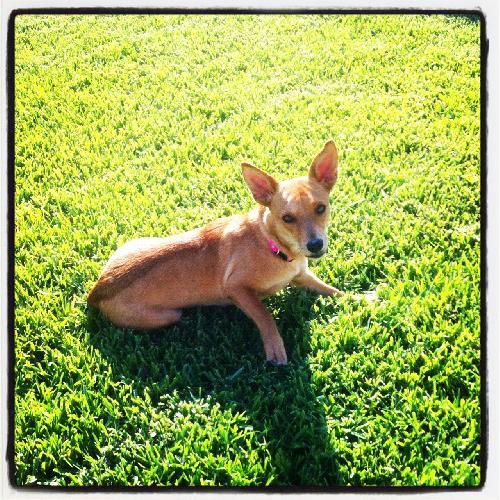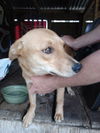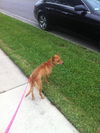
| My Rescue |
| Login to Remember your Favorite Animals and Breeds! |
Ziva was dumped in a neighborhood where she was lucky enough to find someone who rescues dogs. After trying to find the owner for almost 2 weeks, they requested help from our organization in finding this sweet dog her forever home. This is what her rescuer had to say:
She's dog, cat, and kid friendly and I think she's probably a corgi/doxie mix or something. She's very cute, and is a sweet little girl. I'm guessing her age to be about 8-10 months old.
Volunteer update: Ziva does very well on the leash. She curled up in my lap for some cuddles. She gives kisses and is a very loving girl!
According to www.dogbreedinfo.com, the first traces of a dog similar to the Basenji are found in Egyptian tombs and wall drawings of five thousand years ago. Also called the Congo Dog, it was brought to Europe in 1934. English breeders refined it and exported it all over the world. In Africa, it is used as a guide in the forests, to warn against the approach of dangerous animals, and as a very active pack-hunting dog of small game. The Basenji is alert, affectionate, demanding, energetic and curious. It loves to play and makes a good pet, as long as it is handled regularly from an early age. It is very intelligent, responds well to training with a strong desire to please. They can be reserved with strangers. The Basenji is somewhat aloof, but can also form strong bonds with people. It should not be trusted with non-canine pets. They are usually patient, but do best with older considerate children. The Basenji dislike wet weather. They like to chew, so giving them lots of toys of their own would be a good idea. The breed likes to climb and can easily get over chain wire fences. Basenji are very clever at getting their own way, they succeed less by obstinacy than by charm. It has the unique properties of not barking (it makes a low, liquid ululation instead) and of cleaning itself like a cat. It can be described as speedy, frisky, tireless at play and teasing the owner into play. Their strong desire to play can lead to behavior problems if left alone. Most Basenji problems usually involve a mismatch between owner and pet. The owners mistake the adjective "quiet' to mean inactive instead of noiseless; thus, they become harassed by an active, though relatively silent , dog. They have a life expectancy of 10-12 years.
Other Pictures of Ziva the Cute Little Basenji Mix (click to see larger version):
 31.8k |
 44.2k |
 22.3k |
 42.7k |
 65.4k |
Copyright © Pet Rescue by Judy





